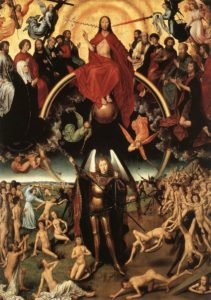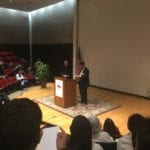“Universities Are Holdouts Against Bishops”
Many “progressive Catholics” remain in the Church only because they have found refuge on college campuses “where the long arms of a bishop cannot reach,” writes Fr. Richard McBrien, the Crowley-O’Brien Professor of Theology at the University of Notre Dame, in his latest screed against the Vatican and the U.S. bishops.
He also mentions that those who have been waiting for ‘ultra-conservatives’ like Pope John Paul II and Benedict to die off are like Moses waiting for the promised land. He thinks that the next Pope will change everything that they have done. (Mind you, he had the same prediction at the last conclave). One of the things he will stop doing is “overemphasizing the abortion issue.” Yes he remains a professor of Catholic theology and a priest. So abortion is wrong but overemphasized? Maybe we should start overemphasizing social justice issues like “there isn’t a great enough variety of races represented in this room,” we can’t call ourselves a community anymore. Don’t ask people, I’ve heard it said (last week at a parish meeting).
The bishops can reach these corners but unfortunately it usually means breaking open a damn of criticism coming from the same university they are willing to correct. (A simple letter of excommunication to a professor would so just fine.) What’s this?
The U.S. Conference of Catholic Bishops will be meeting in Baltimore next week, and part of the agenda is a proposed document on the relationship between bishops and theologians.
While the bishops try to figure out how to use the power they already have in the most appropriate way to clean up higher education in the United States, the director of The Exorcist and Georgetown graduate Peter Blatty is fed up and skipping to the top of chain by filing a canon lawsuit with the Vatican.
Blatty’s tale of Georgetown is both: a rueful story of faith abandoned and trust betrayed, and a horrific scenario for the Catholic Church, whose Faithful sacrificed for more than two centuries to build Georgetown’s reputation.Of course, the decimation of “Catholic” began long ago when we first looked with envy toward Harvard and reduced the Jesuit curriculum. The dissidents came later, some in Roman collars and others who found personal gain in the movement against Church authority. Georgetown galloped toward secularism; even crucifixes disappeared from classrooms.Then, in the early 1980s, a top New York public relations firm counseled the university that it was misguided to diminish its Catholic identity. Their report showed how Catholic identity was a valuable “brand” to be exploited in fundraising and recruitment. Georgetown got the memo but pursued a cynical path. In the prose, Latin quotes and other cosmetics, Georgetown would tell the world that it was “Catholic and Jesuit.” At black-tie alumni dinners, a Jesuit would be placed at every table like a flower centerpiece. The march toward secularism and moral relativism continued.Debate is the servant of truth. In this case, debating whether Georgetown is Catholic has itself become a deception. Some say yes, some say no. But it does not matter what we think. There is only one accrediting agency that gets the last word. In 1990, Pope John Paul II, a former university professor, finally issued a normative constitution for Catholic universities, Ex corde Ecclesiae. Georgetown has a metric, but its leaders have chosen willfully to ignore it.Blatty has great love for Georgetown. The 1950 graduate attended the University on scholarship. He was a Hoya editor, and his son was a Hoya editor. He thanked Georgetown in The Exorcist for “teaching me how to think.”As for Georgetown’s Catholic identity, Blatty states flatly, “It is not too late.” His canon law petition will ask whether Church officials agree.
Ask Georgetown to become Catholic again at gupetition.org.





